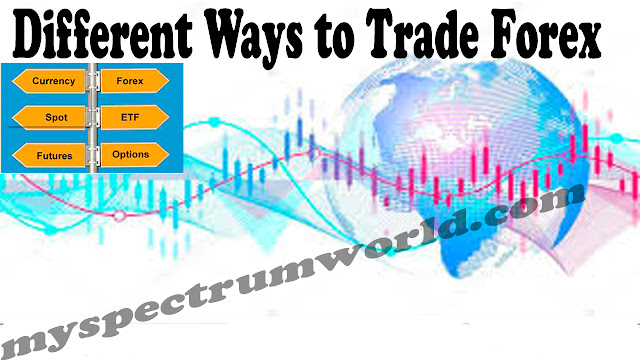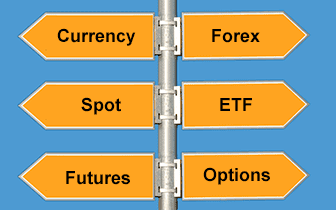Different Ways to Trade Forex
Because Forex is so Valuable,traders came up with a number of different ways to invest or speculate in currencies. Among these,the most popular ones are Forex Spot, Futures,Options, and exchange-traded funds (or ETFs).
Spot Market
In the spot market, currencies are traded immediately or "on the spot," using the current market price. What's valuable about this market is its simplicity, liquidity, tight spreads, and round-the-clock operations. It's very easy to participate in this market since accounts can be opened with as little as a $30.
The New York Stock Exchange (NYSE) is an example of an exchange where traders buy and sell stocks for immediate delivery. This is a spot market.
There two main types of spot markets – over-the-counter (OTC) and organized market exchange.
Futures
Futures are contracts to buy or sell a certain asset at a specified price on a future date (That's why they're called futures!). Forex futures were created by the Chicago Mercantile Exchange (CME) way back in 1972.Since futures contracts are standardized and traded through a centralized exchange,the market is very transparent and well-regulated. This means that price and transaction information are readily available.
Futures are derivative financial contracts that obligate the parties to transact an asset at a predetermined future date and price. The buyer must purchase or the seller must sell the underlying asset at the set price, regardless of the current market price at the expiration date.
Differences between forward and futures market
Forward markets are used to contract for the physical delivery of a commodity. By contrast, futures markets are 'paper' markets used for hedging price risks or for speculation rather than for negotiating the actual delivery of goods.
Options
An "option" is a financial instrument that gives the buyer the right or the option, but not the obligation, to buy or sell an asset at a specified price on the option's expiration date. If a trader "sold" an option, then he or she would be obliged to buy or sell an asset at a specific price at the expiration date.
Just like futures, options are also traded on an exchange, such as the Chicago Board Options Exchange, the International Securities Exchange, or the Philadelphia Stock Exchange. However, the disadvantage in trading Forex options is that market hours are limited for certain options and the liquidity is not nearly as great as the futures or spot market.
What is option with example?
Now that you know the basics of options, here is an example of how they work. The strike price of $70 means that the stock price must rise above $70 before the call option is worth anything; furthermore, because the contract is $3.15 per share, the break-even price would be $73.15.
The two most common types of options are calls and puts:
Call options. Calls give the buyer the right, but not the obligation, to buy the underlying asset.
Put options. Puts give the buyer the right, but not the obligation, to sell the underlying asset at the strike price specified in the contract.
Exchange-traded Funds(ETFs)
Exchange-traded funds or ETFs are the youngest members of the Forex world.
An ETF could contain a set of stocks combined with some currencies, allowing the trader to diversify with different assets. These are created by financial institutions and can be traded like stocks through an exchange. Like Forex options, the limitation in trading ETFs is that the market isn't open 24 hours. Also, since ETFs contain stocks, these are subject to trading commissions and other transaction costs. They combine features and potential benefits of stocks, mutual funds, or bonds. Like individual stocks, ETF shares are traded throughout the day at prices that change based on supply and demand.
Next Read:






No Comments